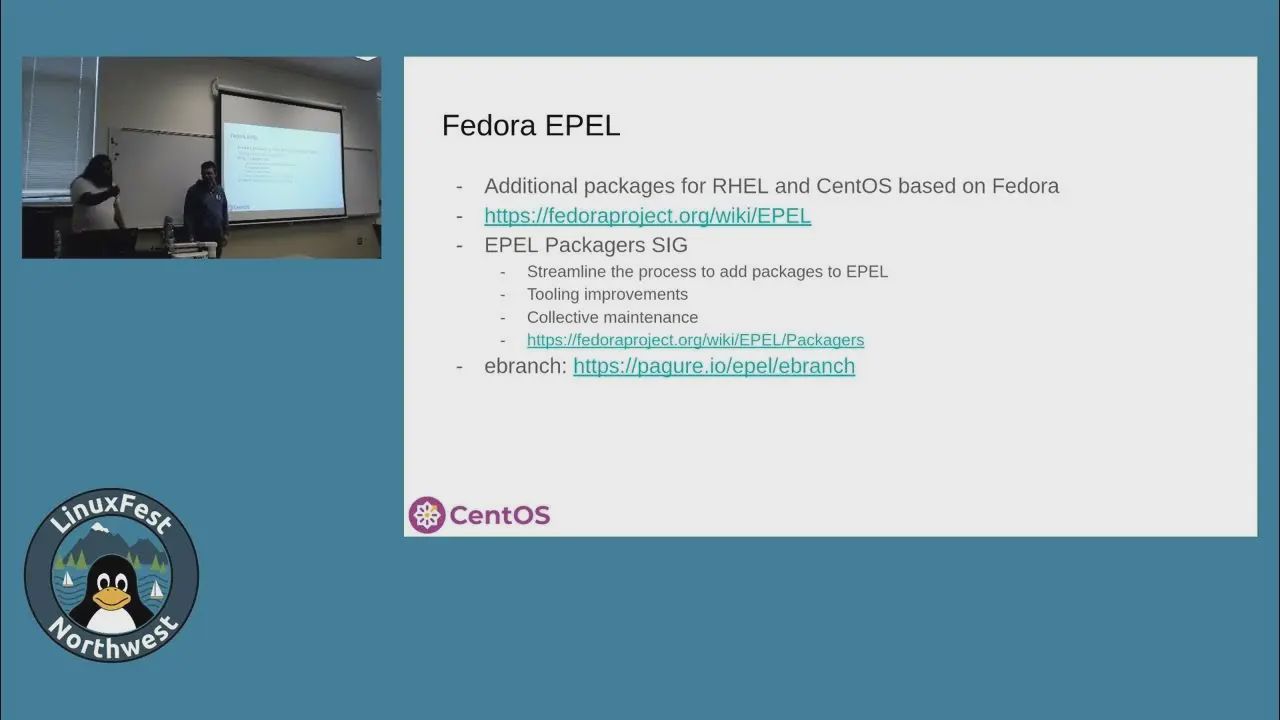CentOS Stream & Hyperscale SIG showcase (aka. "how to make Enterprise Linux suck less")
(www.youtube.com)
from boredsquirrel@slrpnk.net to linux@lemmy.ml on 04 Jun 12:29
https://slrpnk.net/post/10210345
from boredsquirrel@slrpnk.net to linux@lemmy.ml on 04 Jun 12:29
https://slrpnk.net/post/10210345
I found the talk really interesting, especially how CentOS-Stream means SIGs can fork the hell out of it.
The Hyperscale SIG highly modifies it, by backporting tons of packages, shipping modern Kernel, systemd and more.
They also ship btrfs-kmod to use BTRFS like an out-of-tree driver on regular RHEL/CentOS.
They enable livepatching for the Kernel.
And a lot more!
PS: if you are looking for the official LTS Linux kernel, built for Fedora, CentOS & RHEL, check out this COPR

threaded - newest
Here is an alternative Piped link(s):
https://piped.video/watch?v=TFwsfIeF_Xc
Piped is a privacy-respecting open-source alternative frontend to YouTube.
I’m open-source; check me out at GitHub.
It’s ironic that CentOS Stream (specifically the killing of old CentOS for the sake of it) is what made Enterprise Linux sucks in the first place.
Were you building it, supporting it, or using it?
I had no idea about this, but listen to the talk, it is really informative.
Being upstream of RHEL, instead of Downstream, they have way more freedom. They can test things out, and be more like Fedora.
But yes, CI/CD means Stream will not have long supported stable point releases, but continuous fixes.
I think it is so stable that these should just work, and small updates are not as breaking as bigger ones.
Meta uses CentOS Stream extensively, and even the completely hacked together Hyperscaling version of it, being more close to Fedora server, while improving performance through a dedicated set of packages that are well maintained, selected and branched off Fedora.
CentOS Stream is still really stable. It has 5 years of support, which is not 10, but that amount of support is extreme work. Imagine backporting security fixes to a 10 year old kernel.
The normal Linux LTS kernel has 2 years of support now. CentOS is already really old in comparison.
Paying for Software is okay, and RedHat doesnt seem to waste money.
Mainly a Debian user, but have used CentOS at times. Quite informed on the happening as well.
CentOS 9 was doing quite well until Red Hat shortened its lifetime. Red Hat also called the FOSS community a bunch of “freeloaders”.
I think the consensus these days is to use Alma Linux or Rocky Linux for enterprise stuff.
Speaking of stable, Debian and Ubuntu LTS easily provide 5 years support. Both Alma & Rocky picked up where CentOS 9 left off.
Yes true, Almalinux and Rockylinux make sense.
Having a continuously delivered enterprise distro sounds reasonable for me, but doesnt make sense if updates are an issue.
I found this video interesting
Here is an alternative Piped link(s):
this video interesting
Piped is a privacy-respecting open-source alternative frontend to YouTube.
I’m open-source; check me out at GitHub.
Updates tend to be an issue, especially when it comes to changes in application interfaces. We’ll never know what would break after a major update.
This is why point release distro remains the majority in enterprise world.
Perhaps immutable distros are there to provide that continuous update while having the ability to rollback.
Very interesting. I dont think that app interfaces should break between releases? But CentOS Stream doesnt really have releases so yeah, very fair point.
You actually convinced me that it is likely completely bad for using on Servers. It is just a testing OS for upstream RHEL.
I liked a YT Video about this. CentOS Stream now is upstream of RHEL, RockyLinux and Almalinux. If one of these projects wants to fix a bug, they can implement the fix in Stream and all get the fix.
If they have good reason, they totally should! In fact this is pretty common.
One prominent example would be how runtime files for PostgreSQL & MySQL are incompatible between major version. E.g. if you’re to upgrade from postgres 11 to 12, you’ll need to do migration.
A lot of command line programs change their default behaviors, deprecate options, etc. This may not be so for coreutils (cp, mv, ls, ln, et al.), but for the more actively developed programs.
In the end, it might not be complete bad to have rolling release on servers, but in most case, it’s not worth the headache.
Is this an actual quote? Ballsy statement given that half of those freeloaders are on their payroll!
Here’s something to get you started.
Don’t take my word for it, tho. Do your own research as well!